MercoPress. South Atlantic News Agency
Tag: Brazil economy
-
Monday, September 29th 2014 - 08:47 UTC
Opening the economy “would be a disaster for Brazilian industry” states Rousseff minister
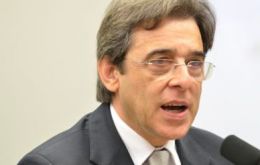
Anticipating what could be policy under a second government of President Dilma Rousseff, her Trade Minister Mauro Borges told Brazilian daily Folha do Sao Paulo that opening the country to more foreign trade would be a “disaster for Brazilian industry” and lead to the “mexicanization” of the economy, in reference to the light assembly factories known as “maquiladoras” that dominate Mexico’s non-oil exports.
-
Thursday, September 11th 2014 - 04:30 UTC
Despite all the negative economic data, Argentina's stock market has almost doubled this year
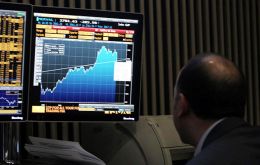
Despite all the negative news on government restrictions imposed on the Argentine economy and the shortage of hard currency, the country's Merval Index has skyrocketed almost 100% this year, the highest of any stock market in the world. It includes many of the largest companies in the country such as Telecom Argentina and Energy Petrobras, along with banks and a steel maker.
-
Saturday, September 6th 2014 - 06:27 UTC
Brazil's industrial activity shows the economy if far from a strong recovery
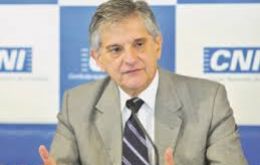
Industrial-activity data released this week added to worries that Brazil's economy, already in recession, is far from a strong recovery. The trade group National Confederation of Industry, CNI, said revenue for the Brazilian manufacturing sector fell 5.1% in July from a year earlier and rose 1.2% from June.
-
Saturday, August 30th 2014 - 11:49 UTC
Marina pledges to restore Brazil credibility and limit spending below growth rate
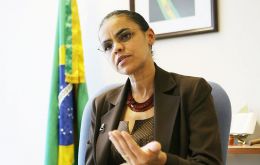
Opposition presidential candidate Marina Silva said that Brazil's recession is very worrying and her government would work to restore the credibility of the country's economic policies to recover investment and growth if elected. The Brazilian economy fell into recession in the first half of the year, a heavy blow for President Dilma Rousseff's already diminishing hopes of winning re-election in October.
-
Saturday, August 30th 2014 - 10:53 UTC
Brazil in recession; Minister Mantega blames external factors and World Cup

Brazil has fallen into recession, further weakening President Dilma Rousseff, just weeks before voting in what will be a tough re-election battle. Brazil's national statistics institute said Friday GDP shrank 0.6% in the second quarter and revised an initially positive first quarter growth estimate down to -0.2 percent.
-
Monday, August 11th 2014 - 08:06 UTC
Brazil's July inflation surprises and slows to 0.01%, and 6.5% in twelve months

Brazil's Broad Consumer Price Index (IPCA) ended July at 0.01%, the Brazilian Geography and Statistics Institute (IBGE) reported. This figure reflects a decrease compared to June (0.4%) with transport and personal expenses items, contributing for the reduction.
-
Thursday, August 7th 2014 - 07:26 UTC
Brazil's July auto output and sales plummet 20.5% and 13.9% compared to 2013

Auto production in Brazil during July dropped 20.5% from a year earlier, national automakers' association Anfavea said on Wednesday, while sales slid 13.9%. Compared to June, production rose 17% and sales 11.8%, as July had an additional two working days.
-
Wednesday, August 6th 2014 - 07:57 UTC
Brazil denies any 'stagflation' and forecasts economy with 'reasonable' growth level in 2015
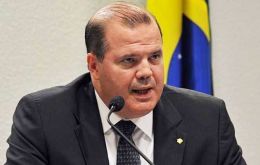
Brazil is far from stagflation, central bank chief Alexandre Tombini said on Tuesday, forecasting the economy will pick up speed and inflation will ease in coming months. In similar terms Economy minister Guido Mantega said the economy should pick up in the second half of the year after a slow start and hit more “reasonable” growth levels in 2015.
-
Saturday, July 26th 2014 - 06:24 UTC
Santander apologizes to President Rousseff for leaking 'political bias' comments
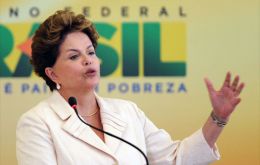
Banco Santander Brasil SA, apologized for a note sent to some of its high-income clients in Brazil saying the economy would worsen if President Dilma Rousseff’s chances of being re-elected stabilized or improved.
-
Friday, July 18th 2014 - 07:45 UTC
Brazil leaves basic interest rate unchanged at 11%; no surprises expected ahead of October election

Brazil held interest rates unchanged for a second straight time this week but did not commit to keeping them stable for long as inflation remains high in Latin America's top economy. The Brazilian economy performance is anemic and next October president Dilma Rousseff is bidding for re-election.
